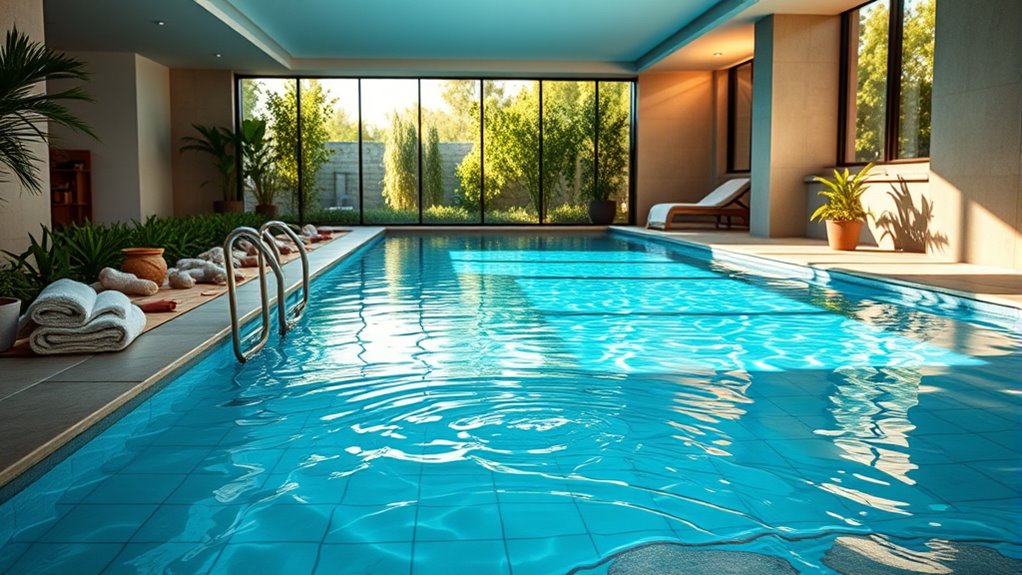Hydrotherapy pools offer you a wealth of benefits for health and wellness. The warm water relaxes your muscles, eases joint pain, and reduces stress levels. Buoyancy helps you engage in gentle exercise without putting pressure on your joints, enhancing strength and flexibility. Plus, the calming environment boosts your mental well-being by promoting relaxation and increasing endorphin release. If you’re curious about how hydrotherapy can further support your recovery and overall health, keep going to uncover more insights.
Key Takeaways
- Hydrotherapy pools provide warm water therapy that relaxes muscles and reduces joint pain, promoting overall physical wellness.
- The buoyancy of water alleviates pressure on joints, making physical activity easier and enhancing mobility.
- Regular use of hydrotherapy pools improves circulation, aiding in recovery from injuries and promoting healing.
- Sessions in hydrotherapy pools can reduce stress and anxiety, supporting mental health and emotional well-being.
- Hydrotherapy encourages mindfulness and self-awareness, contributing to cognitive benefits like improved focus and mental clarity.
What Is Hydrotherapy?
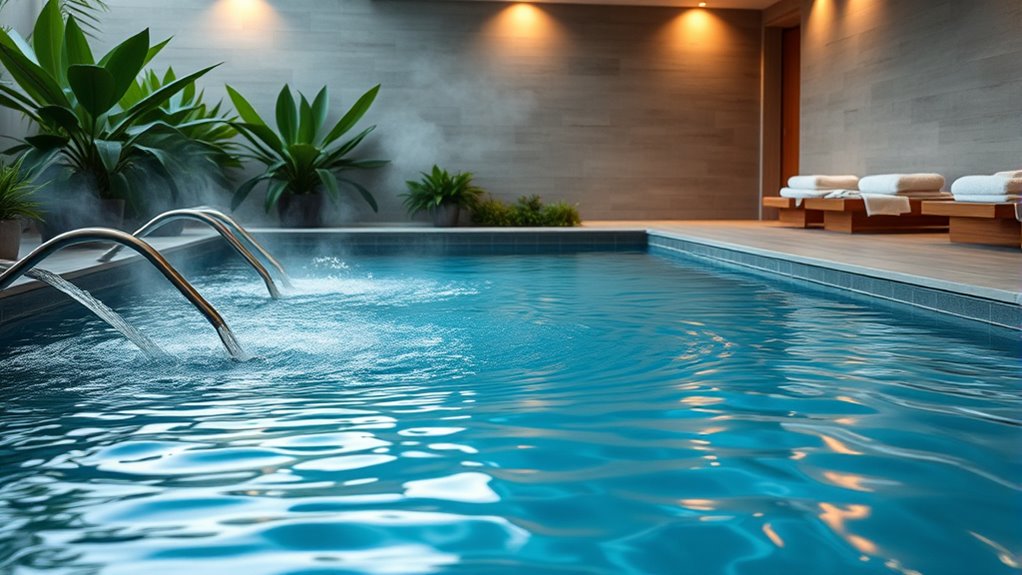
Hydrotherapy is a powerful practice that harnesses the healing properties of water to promote wellness. This form of water therapy utilizes various techniques, such as warm water baths and pressurized jets, to deliver therapeutic effects tailored to your needs.
Whether you’re managing arthritis, recovering from surgery, or seeking relief from fibromyalgia, regular hydrotherapy can enhance your physical therapy regimen. The temperature, pressure, and flow of water can be adjusted, allowing for a personalized experience that maximizes pain relief and relaxation.
Regular hydrotherapy offers tailored relief for conditions like arthritis and fibromyalgia, enhancing your physical therapy experience.
You can engage in these treatments at home or in specialized clinics, but it’s vital to consult your healthcare provider before starting hydrotherapy to guarantee safety and address any risks.
Embrace the therapeutic benefits that water can offer!
Benefits of Hydrotherapy Pools
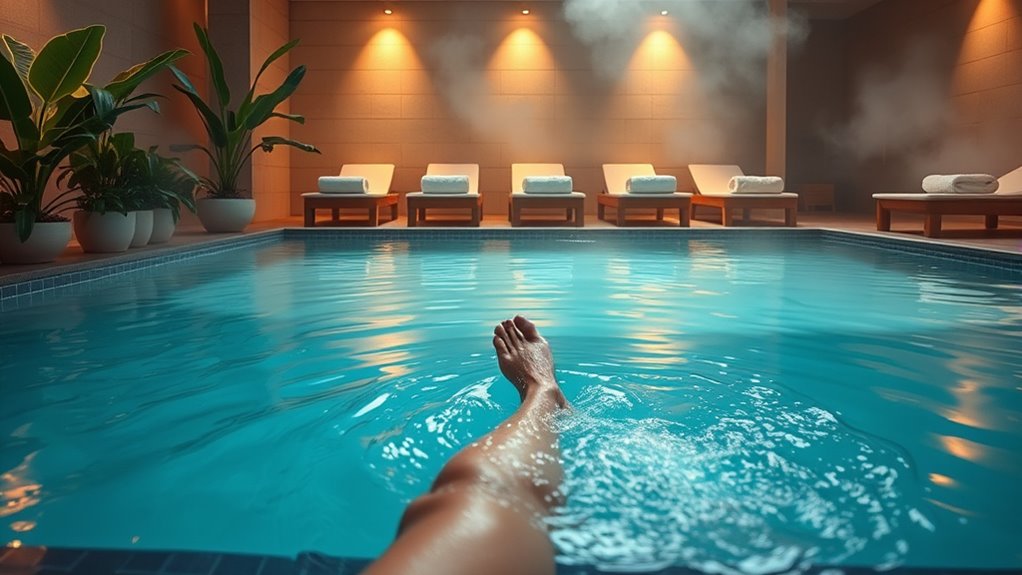
When you step into a hydrotherapy pool, you’re not just easing into warm water; you’re immersing yourself in a therapeutic experience that offers a multitude of benefits.
The warm temperature, typically between 34°C and 40°C, helps relax your muscles, reduces joint pain, and improves circulation. The buoyancy of the water alleviates pressure on your joints, making physical activity easier, especially if you’re dealing with arthritis or recovering from injuries.
Regularly using hydrotherapy pools enhances muscle strength and flexibility, as the water’s resistance allows for gentle exercise without the strain.
Additionally, the calming environment helps reduce stress and anxiety, contributing to improved mental health and overall well-being.
Embrace these benefits and elevate your wellness journey through hydrotherapy.
How Hydrotherapy Aids in Recovery

Utilizing warm water for recovery can transform your healing process, offering a soothing environment for both body and mind. Hydrotherapy, or pool therapy, enhances your recovery by relaxing muscles and reducing tension, which alleviates pain and stiffness after injuries or surgeries. The buoyancy of warm water allows you to perform gentle exercises, improving joint mobility without pain. Improved circulation from hydrotherapy delivers oxygen and nutrients to your tissues, crucial for the healing process. Regular sessions can also lower cortisol levels, reducing stress, which is essential for holistic recovery.
| Benefits | Description | Conditions Treated |
|---|---|---|
| Muscle Relaxation | Reduces tension and pain | Fibromyalgia, Osteoarthritis |
| Joint Mobility | Facilitates gentle rehabilitation | Post-surgery |
| Improved Circulation | Enhances nutrient delivery for healing | Joint replacement recovery |
Psychological Advantages of Hydrotherapy
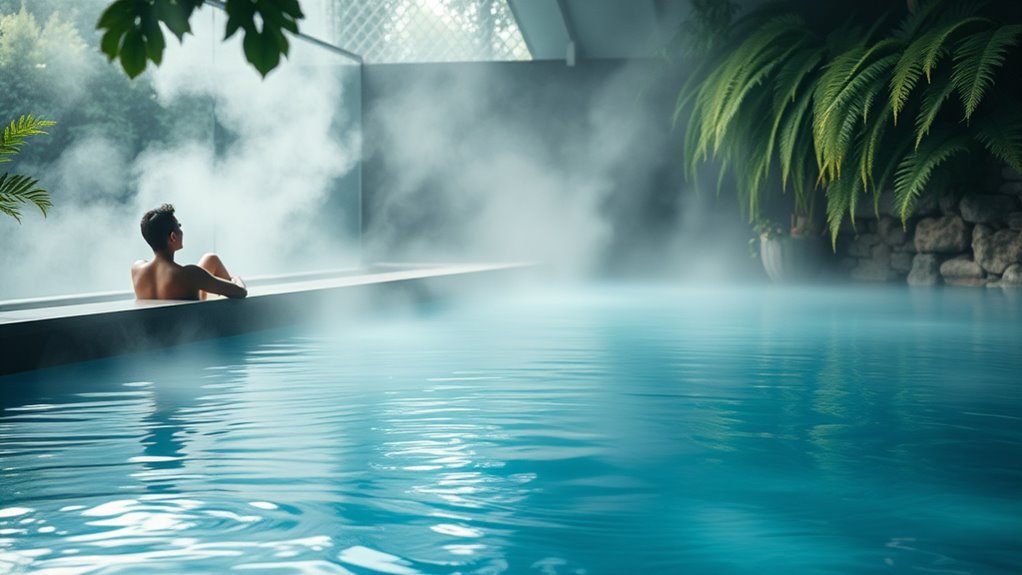
The soothing effects of warm water don’t just benefit your body; they greatly impact your mind as well. Hydrotherapy offers significant psychological advantages that enhance your overall mental well-being.
Warm water’s soothing effects extend beyond the body, profoundly enhancing mental well-being through hydrotherapy.
Here are some key benefits:
- Promotes relaxation and reduces stress, lowering cortisol levels.
- Stimulates endorphin release, boosting your mood and alleviating anxiety.
- Provides low-impact exercise, improving emotional health for those with joint pain.
- Fosters mindfulness and self-awareness in a calming environment.
These therapeutic sessions not only help you unwind but also improve cognitive benefits like focus and mental clarity.
Safety and Risks of Hydrotherapy
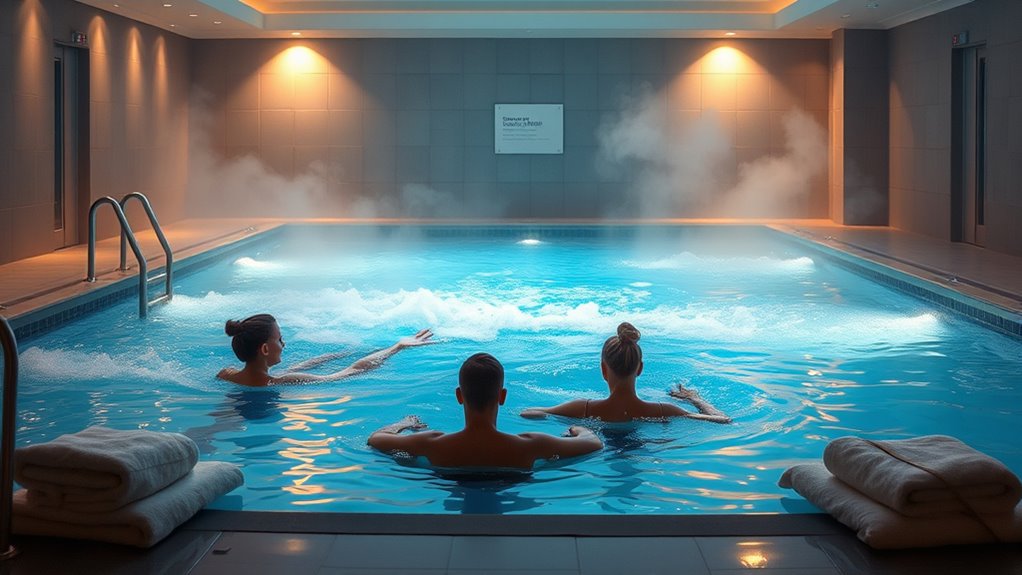
While hydrotherapy can offer numerous benefits, it’s important to be aware of the associated safety risks.
Slips and falls are common in therapy pools, so using handrails and non-slip surfaces is essential for your safety.
Additionally, be mindful of water temperature; improper monitoring can lead to burns or frostbites.
Regular cleaning and sanitation are critical to prevent infections in hydrotherapy pools, guaranteeing a safe environment.
If you have certain medical conditions, consult your healthcare provider before diving in to avoid potential adverse effects.
Finally, always verify that your hydrotherapy treatments are administered by certified professionals, as their expertise can greatly minimize risks and enhance your overall safety during the therapy process.
Accessing Hydrotherapy Services
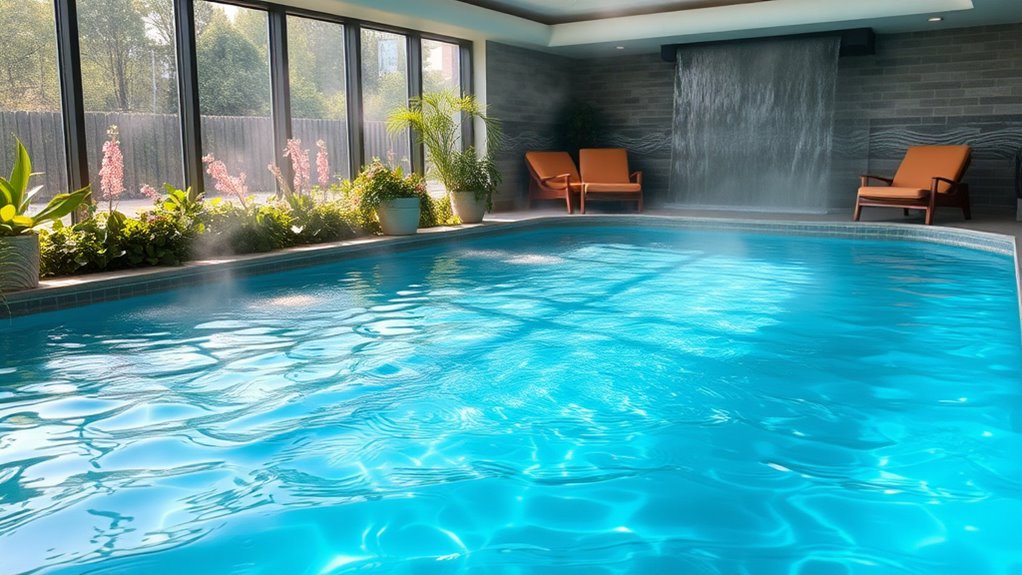
Accessing hydrotherapy services is easier than you might think.
You can often get a referral from your healthcare team through the NHS, or even self-refer in some areas.
Additionally, local support groups may offer classes, while private providers can give you more options if you prefer that route.
NHS Referral Process
To access hydrotherapy services through the NHS, you’ll typically need a referral from a healthcare professional like your GP or physiotherapist.
In some areas, you might be able to self-refer to NHS physiotherapy services, allowing you to request hydrotherapy directly.
Here’s what you can expect:
- An assessment to determine if hydrotherapy suits your condition
- Inclusion of hydrotherapy in your extensive treatment plan
- Focus on rehabilitation for issues like arthritis and chronic pain
- Variability in service availability by region, so check local NHS facilities
Confirming access options with your local physiotherapy department guarantees you get the right support for your rehabilitation journey.
Private Provider Options
If you’re considering hydrotherapy services, private providers offer a variety of options tailored to your specific health needs. You can find hydrotherapy through wellness spas, fitness centers, and specialized clinics that provide personalized treatments.
It’s essential to verify that these facilities employ certified professionals trained in hydrotherapy practices. Many private providers offer a range of services, including warm water pools and aquatic therapy sessions, designed to address various conditions like arthritis and muscle pain.
While accessing these services may require a referral from your healthcare provider, some facilities allow self-referrals for initial consultations. Researching locations ensures that you find the best provider for your specific needs.
Keep in mind that costs can vary markedly based on location and facility, so it’s wise to ask about pricing and available packages before committing.
Local Support Groups
While exploring the options for hydrotherapy services, local support groups can be invaluable resources to help you find the right care. They often provide essential information on accessing these services, whether through NHS referrals or private healthcare options.
Here’s how they can help you:
- Connect with HCPC registered physiotherapists specializing in hydrotherapy.
- Learn about self-referral options to NHS physiotherapists for easier access to aquatic therapy.
- Discover local arthritis support groups offering specialized sessions for joint-related issues.
- Enhance your awareness of available hydrotherapy facilities and programs in your community.
Engaging with these local support groups not only opens doors to needed services but also fosters a supportive environment for your health and wellness journey.
Frequently Asked Questions
What Are the Benefits of Hydrotherapy Pools?
Hydrotherapy pools offer numerous benefits that can enhance your well-being.
You’ll experience relief from muscle tension and joint pain due to the warm water, which promotes relaxation.
The buoyancy allows you to engage in low-impact exercises, improving your mobility without straining your body.
Regular use can boost circulation, aiding recovery and overall fitness.
Plus, the calming environment helps reduce stress and anxiety, leaving you feeling refreshed and rejuvenated.
How Does Hydrotherapy Promote Healing?
Imagine stepping into a warm embrace of water, where healing begins. Hydrotherapy promotes healing by relaxing your muscles and easing pain, helping you recover from injuries or manage chronic conditions.
The buoyancy lifts the weight off your joints, allowing you to move freely without discomfort. As blood circulation improves, your body receives more oxygen and nutrients, speeding up recovery.
Plus, the calming effect of water lowers stress, supporting both your physical and emotional well-being.
What Are the Psychological Benefits of Hydrotherapy?
You’ll find that hydrotherapy offers numerous psychological benefits.
When you immerse yourself in warm water, stress and anxiety often diminish, thanks to lower cortisol levels. The buoyancy allows for easier movement, releasing endorphins that lift your mood.
This calming environment can enhance your focus and mental clarity. Plus, the tactile sensations from the water foster emotional healing, helping you reconnect with your feelings and promoting overall emotional well-being.
What Are the Primary Effects of Hydrotherapy?
When you engage in hydrotherapy, you experience several primary effects. The warm water alleviates pain and stiffness, helping you move more freely.
You’ll find that your circulation improves, delivering essential nutrients to your tissues. The buoyancy reduces pressure on your joints, making exercise easier and more effective.
Plus, the soothing warmth can lower your stress levels, promoting relaxation and enhancing your overall well-being.
Regular sessions can greatly boost your recovery and mobility.
Conclusion
In the gentle embrace of warm water, you’ll find both relief and rejuvenation. Hydrotherapy pools offer a sanctuary where pain fades away, and relaxation takes center stage. While the soothing currents support your body’s healing, the tranquil atmosphere calms your mind. As you step out, you’re not just leaving behind water; you’re emerging renewed, blending strength and serenity. Immerse yourself in hydrotherapy and experience the balance of physical recovery and mental peace, all in one therapeutic escape.
